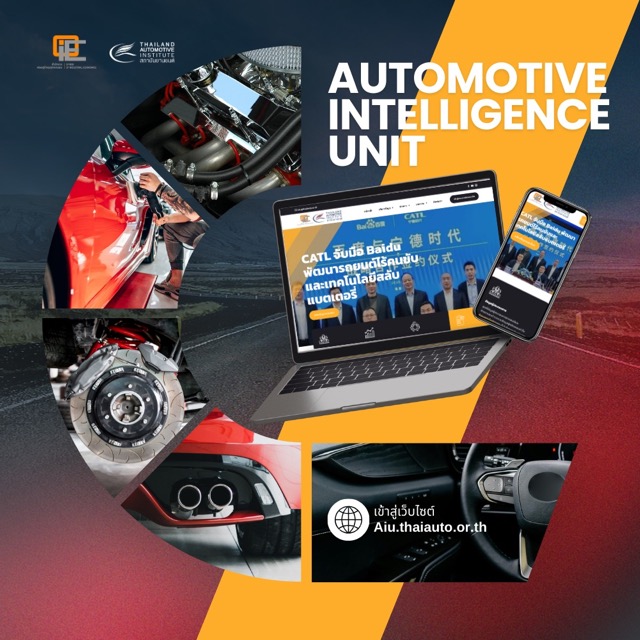- Silver
- สมาชิกระดับ Silver
- ฟรี
- สามารถเข้าถึงข้อมูลข่าวสารขั้นพื้นฐานได้
- ข้อมูลผู้ประกอบการต่างประเทศ
- ข้อมูลสถิติในประเทศและต่างประเทศ
- มาตรการทางการค้าระหว่างประเทศ
- กฎ ระเบียบ นโยบายในประเทศ
- เทคโนโลยี และงานวิจัย
- สมัครสมาชิก
ค้นหาข้อมูล
ความเคลื่อนไหวในอุตสาหกรรม
ที่มา : หนังสือพิมพ์ ฐานเศรษฐกิจ ฉบับวันที่ 22 เมษายน 2562
- รายละเอียด
- หมวด: ความเคลื่อนไหวในอุตสาหกรรม
- อ่าน: 1318 ครั้ง
นายชาญชัย ตระการอุดมสุข ประธานบริหาร มาสด้า เซลล์ ประเทศไทย เปิดเผยว่า ปี 2561 มาสด้าประบความสำเร็จด้านการดำเนินธุรกิจของมาสด้าปีงบประมาณ 2018 มียอดขายสูงถึง 70,468 คัน เติบโต 25% จากปีงบประมาณ 2017 อยู่ที่ 56,379 คัน ครองส่วนแบ่งการตลาด 6.6% สูงสุดเป็นอันดับสองรองจากออสเตรเลีย วันนี้มาสด้าประเทศไทย ถูกจับตามองจากตลาดทั่วโลกเนื่องจากอัตราการเติบโตสูงสุดในโลกสองปีติดต่อกัน ที่สำคัญปริมาณยอดขายเกิน 70,000 คัน ส่งผลให้ มาสด้า ประเทศไทย ขยับขึ้นมารั้งอันดับ 6 ของมาสด้าทั่วโลก ส่วนปี 2019 มาสด้าตั้งเป้าไว้ที่ 75,00 คัน หรือเพิ่มขึ้นประมาณ 5-10% นายชาญชัยกล่าวว่า รถยนต์นั่งมาสด้า 2 ยังคงเป็นพระเอกในการขับเคลื่อนหลัก ได้รับความนิยมจากลูกค้ามากที่สุด มียอดขายสูงถึง 48,119 คัน เพิ่มขึ้น 36% ครองเบอร์หนึ่งในตลาดรถยนต์นั่งขนาดเล็ก 11 เดือนติดต่อกัน ขณะที่รถปิกอัพ มาสด้า บีที 50 โปร เริ่มกลับมาได้รับคามนิยมอีกครั้งหลังจากปล่อยรุ่นพิเศษ มาสด้า บีที 50 โปร ธันเดอร์ ออกสู่ตลาด ด้วยยอดขายสูงถึง 7,500 คัน เติบโต 29% รวมทั้งรถอเนกประสงค์เอสยูวีมาสด้า CX-5 มียอดขาย 6,834 คัน เพิ่มขึ้น 7% ตามมาด้วยรถเก๋งคอมแพกคาร์มาสด้า 3 มียอดขาย 4,852 คัน ส่วรนฟรีสไตล์ครอสโอเวอร์ มาสด้า CX-3 ทำยอดขายได้ 3,132 คันและรถสปอร์ตเปิดประทุนหลังคาไฟฟ้าที่เปิด – ปิดเร็วที่สุดในโลก มาสด้า MX-5 มียอดขาย 31 คัน
ที่มา : หนังสือพิมพ์ มติชน ฉบับวันที่ 19 เมษายน 2562
- รายละเอียด
- หมวด: ความเคลื่อนไหวในอุตสาหกรรม
- อ่าน: 1381 ครั้ง
นิสสัน เดินหน้าสร้างการรับรู้ให้รถพลังงานไฟฟ้า “อีวี” และข้อดีของการซื้อ “ลีฟ” มาใช้งาน ทั้งในแง่ประสิทธิภาพ สมถรรนะ ต้นทุนต่อหน่วยงานวิ่งต่ำรวมถึงการนเป็นมิตรต่อสิ่งแวดล้อมล่าสุดเผยผลวิจัยมลพิษทางเสียงจากการจราจร พบว่าเมืองใหญ่ในเอเชียรวมถึงกรุงเทพฯ มีระดับเสียงรบกวนสูงกว่ามาตรฐานถึง 4 เท่า มลพิษทางเสียงการจราจรกลายเป็นภัยคุกคามอันดับททื่ 2 ต่อสิ่งแวดล้อม และสุขภาพของประชาชนนิสสันเอเชียและโอเชียเนียได้เผยแพร่ผลศึกษามลพิษทางเสียงที่กำลังเพิ่มสูงขึ้น เพื่อสร้างความตระหนักถึง ซึ่งการใช้รถยนต์ไฟฟ้า 100% สามารถจัดการกับความเสี่ยงที่กำลังเพิ่มขึ้นนี้ จากข้อมูลขององค์การอนามัยโลก (WHO) การได้รับมลพิษทางเสียงในระยะยาว จากการจราจรที่สูงกว่า 53 เดซิเบล (dB) อาจส่งผลให้เกิดผลเสียต่อสุขภาพเช่น โรค ความดันโลหิตสูง โรคหลอดเลือดหัวใจ การสูญเสียการได้ยิน หรือแม้กระทั่งภาวะหัวใจวาย ซึ่งระดับเสียงรบกวนที่เกิดขึ้น ทั่วทั้งเอเชียและเมืองใหญ่ของโคเอเชียอย่างกรุงเทพฯ,โฮจิมินห์ซิตี้,จาการ์ตา,ฮ่องกง,มะนิลา,เมลเบิร์น,สิงคโปร์ และโซล โดยเฉลี่ยอยู่ที่ 76 เดซิเบลหรือเกือบ 4 เท่าของระดับเสียงที่เหมาะสม เสียงที่รบกวนเหล่านี้ได้รับการพิสูจน์ทางวิทยาศาสตร์ว่าส่งผลกระทบต่อสุขภาพของผู้อยู่อาศัยในเมืองเมื่อเวลาผ่านไปและเทียบเท่ากับเสียงนาฬิกาปลุกเสียงเรียกเข้า (ประมาณ 80 เดซิเบล) ในทางกลับกันระดับมลพิษทางเสียงที่ลดลงจะสามารถลดความรู้สึกหงุดหงิดบนท้องถนน เพิ่มประสิทธิภาพด้านการรับรู้ และให้ผลดีหลายด้านเพิ่มมากขึ้น นิสสันวัดและเปรียบเทียบเสียงของถนนทั่วเมืองทั่วไป กับถนนที่มีระดับเสียงจากรถยนต์ไฟฟ้า 100% โดยใช้เครื่องวัดระดับเสียง ผลลัพธ์แสดงระดับเสียงรบกวนบนท้องถนนทั่วไปสูงสุดที่ 90 เดซิเบลเมื่อเทียบกับเสียงที่เกิดจากรถยนต์ไฟฟ้า อย่างนิสสัน ลีฟ เกิดเสียงดังเพียง 21 เดซิเบลหรือมีความเงียบกว่าห้องสมุด (ประมาณ 30 เดซิเบล) และเมื่อเปรียบเทียบกับค่าเฉลี่ยของเสียงที่มาจากเครื่องยนต์ที่ใช้น้ำมันเบนซินหรือดีเซล ที่ประมาณ 76 เดซิเบลรถยนต์ไฟฟ้าจะเป็นตัวเลือกที่ช่วยลดมลพิษเสียงจากจราจรได้
ที่มา : หนังสือพิมพ์ ฐานเศรษฐกิจ ฉบับวันที่ 18 เมษายน 2562
- รายละเอียด
- หมวด: ความเคลื่อนไหวในอุตสาหกรรม
- อ่าน: 1547 ครั้ง
AV testing
Overall, China has issued 101 license plates for autonomous vehicles owned and operated by 32 different companies, according to records released by the government in February. Baidu holds at least 45 of those licenses. The company has only disclosed the number of AVs it operates in Beijing, but not the rest of the country. Daimler and Audi are among those with licenses to test in China."China has made no secret about its ambition to get in front on autonomy, and the play here would be electric, shared, and autonomous," Dunne said. "The environment is conducive to rapid growth."While the world eyes China, three of North America'a front-runners -- Waymo, Ford and GM's Cruise Automation -- do not yet hold testing permits in the country, though Baidu tests systems integrated into Ford vehicles as part of an AV-related partnership between the companies.
Delphi roots
Aptiv is the tech-minded company created when Delphi split in half in December 2017. Through those roots, the company has held a manufacturing and engineering presence in China since 1993. That will provide a base for the burgeoning autonomous operations.The company says its test cars will be on the road in a matter of weeks. But no long-term partnerships have been announced with ride-hailing networks, vehicle manufacturers, or companies that make high-definition maps for use in self-driving systems.Iagnemma said the company is in active discussions with potential collaborators.This is the fifth test location for Aptiv. Shanghai joins Boston, Pittsburgh, Las Vegas and Singapore on the list of places where the company is testing Level 4 automated technology, which requires no interaction or oversight from a human while operating in a geofenced environment.While maintaining operations in multiple cities can be an expensive proposition, there's potential risk in concentrating efforts on one or two cities, Iagnemma said."You face more challenges if you move on from one city," he said. "You have very different driving patterns from city to city, so in a way, we're de-risking by continuing to develop in a variety of cities and environments."
Aptiv ตั้งมั่นมพัฒนาเทคโนโลยีรถยนต์อัตโนมัติในประเทศจีนซึ่งเป็นตลาดรถยนต์อัตโนมัติที่มีศักยภาพที่สุดในโลก
Aptiv ได้เปิดศูนย์ Autonomous Mobility Center ในประเทศจีน เพื่อทดสอบรถยนต์อัตโนมัติในระดับที่ 4 บนถนนของเมืองเซี่ยงไฮ้ในอนาคต ซึ่งอาจจะทำให้เกิดบริการ Autonomous ride-hailing ที่คล้ายกับที่ Aptiv ดำเนินการอยู่ร่วมกับ Lyft ที่ ลาสเวกัส สหรัฐอเมริกา ซึ่งจากรายงานของ McKinsey กล่าวไว้ว่า ยานยนต์อัตโนมัติจะเป็นส่วนสำคัญของการเดินทางของประชาชนในประเทศจีนถึงร้อยละ 66 ของระยะการเดินทางทั้งหมด ในปี ค.ศ. 2040 ซึ่งจะสร้างรายได้ว่า 2 ล้านล้านเหรียญสหรัฐ โดย 1.1 ล้านล้านเหรียญสหรัฐ มาจากธุรกิจบริการ และ 900,000 ล้านเหรียญ จากการจำหน่ายรถยนต์อัตโนมัติ
- รายละเอียด
- หมวด: ความเคลื่อนไหวในอุตสาหกรรม
- อ่าน: 1423 ครั้ง
ในงานมหกรรมสมาร์ทโฟนระดับโลก ระดับโลก 2019 จัดขึ้นที่เมืองบาร์เซโลนา ประเทศสเปน คอนติเนนทอล ผู้พัฒนาเทคโนโลยีอัจฉริยะสำหรับผู้ใช้ยานยนต์ ได้จัดแสดงเทคโนโลยีและนวัตกรรมต่างๆ ที่น่าสนใจไม่ว่าจะเป็นระบบเชื่อมต่อยานพาหนะ โมดูลเสาอากาศอัจฉริยะรุ่น 2.0 และระบบเซิร์ฟเวอร์ในยานยนต์ ซึ่งเป็นโซลูชันสำหรับเมืองอัจฉริยะในอนาคต เฮลมุท มาร์สซิ กรรมการบริหารของคอนติเนนทอลและหัวหน้ากลุ่มธุรกิจอุปกกรณ์ภายในรถยนต์ เปิดเผยว่าระบบเชื่อมต่ออัจฉริยะที่ไม่ได้เป็นเพียงแค่ธีมสำหรับงาน MWC ในปีนี้ แต่ยังเป็นโซลูชั่นขอคอนติเนนทอลในที่มุ่งมั่นเน้นให้ระบบขับขี่แห่งอนาคตมีความปลอดภัย ความสะดวกสบายและความอัจฉริยะ เราพัฒนาโซลูชั่นจากความต้องการของผู้ใช้งานที่ต้องการระบบขับขี่อัจฉริยะโดยในงาน MWC ครั้งนี้ เราได้นำเสนอเทคโนโลยีและนวัตกรรมสำหรับระบบการเชื่อมต่อยานยนต์ ระบบชอฟต์แวย์ และระบบประมวลผลที่มีประสิทธิภาพสูงโดยมุ่งเน้นไปที่ประโยชน์ของผู้ใช้ ภายในงานคอนติเนนทอลได้นำเสนอโมดูลเสาอากาศอัจฉริยะรุ่นล่าสุด ที่มีการออกแบบให้มีลักษณะเรียนแบนเป็นพิเศษด้วยแนวคิดการประหยัดพื้นที่ในการติดตั้งบนหลังคายานยนต์ ซึ่งศักยภาพของการพัฒนาโมดูลเสาอากาศรุ่นล่าสุดนี้สามารถใช้ได้กับเทคโนโลยีระบบการสื่อสารแบบไร้สาย 5G และเทคโนโลยีรองรับสำหรับเสาสัญญาณรับส่งคลื่น 4x4 MIMO หรือเรียกว่า Multiple Input Mutiple Output ทำให้สามารถถ่ายโอนข้อมูลในเวลาเดียวกันผ่านเครื่องส่งสัญญาณและตัวรับสัญญาณได้หลากหลายช่องซึ่งหมายความว่าสามารถส่งข้อมูลได้ปริมาณมากขึ้นด้วยอัตราความเร็วสูงสุดผ่านทางเทคโนโลยีอุปกรณ์ไร้สาย นอกจากนี้อิเล็กทรอบิท (บริษัทในเครื่องคอนติเนนทอล) จำนำเสนอแพลตฟอร์มสำหรับติดตั้งชอฟต์แวร์ของห้องโดยสาร ซึ่งมีตัวควบคุมระบบการทำงานที่สามารถรวบรวมข้อมูลการขับขี่ที่เป็นประโยชน์ผนวกเข้ากับแอปพลิเคชั่นแสดงข้อมูลและคววามบันเทิงภายในยานยนต์ ทำให้มั่นใจว่าหน้าจอแสดงผลแอปพลิเคชั่นนั้นเชื่อมต่อกับสื่อมัลติมิเดียจำพวกข้อความ ข้อมูลแสดงกราฟสถิติ ภาพ และเสียงต่างๆ โซลูชั่นนี้เหมาะสมอย่างมากสำหรับธุรกิจรถเช่า เนื่องด้วยผู้โดยสารสามารถปรับแต่งการใช้งานของซอฟต์แวร์ได้ตามต้องการ
ที่มา : หนังสือพิมพ์ ไทยโพสต์ ฉบับวันที่ 17 เมษายน 2562
- รายละเอียด
- หมวด: ความเคลื่อนไหวในอุตสาหกรรม
- อ่าน: 1532 ครั้ง
บริษัท เอสเอไอซี มอเตอร์-ซีพี จำกัด และ บริษัท เอ็มจี เซลล์ (ประเทศไทย) จำกัด ผู้ผลิตและจำหน่ายรถยนต์เอ็มจีในประเทศไทย ยืดเวทีงานบางกอก อินเตอร์เนชั่นแนล มอเตอร์โชว์ 2019 เปิดตัว NEW MG V80 รถ Passenger Van 11 ที่นั่ง เติมเต็มเซ็กเมนท์ (Segment) ของรถยนต์ภายใต้แบรนด์เอ็มจี รองรับกลุ่มเป้าหมายที่ต้องการรถยนต์ขนาดใหญ่เพื่อการเดินทางกับครอบครัวหรือหมู่คณะ กับราคาพิเศษช่วงเปิดตัว พร้อมโชว์สุดยอดยนตรกรรม “รถต้นแบบ MG ZS EV” รถยนต์พลังงานไฟฟ้ารุ่นแรกของเอ็มจีที่สะท้อนแนวทางการพัฒนารถยนต์ที่ขับเคลื่อนด้วยพลังงานทางเลือก (NEW Energy) ตามวิสัยทัศน์หลักขององค์กร พร้อมนำเสนอโปรโมชั่นและข้อเสนอสุดพิเศษในงานฯ ปีนี้ถือเป็นปีที่ 5 ที่เอ็มจีเข้ามาแนะนำแบรนด์และทำตลาดในประเทศไทย ในช่วงระยะเวลาที่ผ่านมาเราได้นำเสนอยนตรกรรมที่มาพร้อมคุณภาพ และโดดเด่นด้วยเทคโนโลยีที่ล้ำสมัยเพื่อสร้างจุดเปลี่ยนให้กับวงการยานยนต์ไทย โดยที่ผ่านมาเราได้รับการตอบรับที่ดีเยี่ยม ประสบความสำเร็จเหนือความคาดหมายด้วยยอดขายรวมในประเทศกว่า 50,000 คัน ในระยะเวลาไม่ถึง 5 ปี และพร้อมเดินหน้าสร้างสรรค์และนำเสนอรถยนต์คุณภาพเพื่อเพิ่มความเชื่อมั่นให้กับผู้บริโภคอย่างต่อเนื่อง รองกรรมการผู้จัดการ บริษัท เอ็มจี เซลล์ (ประเทศไทย) จำกัด ระบุ
ที่มา : หนังสือพิมพ์ ดอกเบี้ยธุรกิจ ฉบับวันที่ 10 เมษายน 2562
- รายละเอียด
- หมวด: ความเคลื่อนไหวในอุตสาหกรรม
- อ่าน: 1397 ครั้ง
EA กระแสแรง! ยอดจองซื้อรถยนต์ไฟฟ้า “MINE Mobility” ในงานมอเตอร์โชว์พุ่งทะลุ 1 พันคัน ตันยอดจองรถยนต์ไฟฟ้ารวม 4,585 คัน แย้มผลงาน Q1 สวย เหตุบุ๊กวินด์ฟาร์มหนุมาน 180 MW จ่อ COD เพิ่มอีก 80 MW หลังสงกรานต์ นายอมร ทรัพย์ทวีกุล รองประธานเจ้าหน้าที่บริหาร บริษัทพลังงานบริสุทธิ์ จำกัด (มหาชน) หรือ EA เปิดเผยถึงการจัดงานมอเตอร์โชว์ ครั้งที่ 40 (Bangkok International Motor Show 2019) ระหว่างวันที่ 27 มีนาคม – 7 เมษายน 2562 ที่ผ่านมา บริษัทมียอดลงทะเบียนจองสิทธิซื้อรถยนต์ไฟฟ้า (Electric Vehicle หรือ EV) ภายใต้แบรนด์ MINE Mobility เข้ามาอย่างต่อเนื่องประมาณ 70-80 คันต่อวัน ทำให้รวมตลอดระยะเวลาการจัดงานมียอดจองรวมประมาณ 1,085 คัน ซึ่งดีกว่าที่คาดการณ์ไว้ที่มียอดจองรวมประมาณ 1,000 คัน เนื่องจากมีผู้บริโภคให้ความสนใจมากขึ้น หลังจากมีการชมรถยนต์ตัวอย่างภายในงานดังกล่าว ทั้งนี้เมื่อรวมกับก่อนหน้านี้ในจำนวนมากถึง 3,500 คัน ส่งผลให้ล่าสุดบริษัทมียอดจองรถยนต์ไฟฟ้าแล้วประมาณ 4,585 คัน โดยใกล้เป้าหมายปีนี้ที่คาดว่าจะมียอดจองรถยนต์ไฟฟ้าแตะระดับ 5,000 คันแล้ว ขณะที่ธุรกิจพลังงานทดแทน ในเบื้องต้นคาดว่าจะมการจ่ายไฟฟ้าเข้าสู่ระบบเชิงพานิชย์ (COD) ของโครงการโรงไฟฟ้าพลังงานลมหนุมานส่วนที่เหลือ (โครงการหนุมาน 10 ) อีก 80 เมกะวัตต์ (MW) ได้ช่วงหลังสงกรานต์ จะส่งผลให้สามารถ COD ได้ครบ 260 เมกะวัตต์จากก่อนหน้านี้ได้ทยอย COD ไปแล้ว 180 เมกะวัตต์ ทำให้ในช่วงไตรมาส 1/2562 มีขนาดกำลังการผลิตรวม 584 เมกะวัตต์ ดังนั้น บริษัทมั่นใจผผลการดำเนินงานในช่วงไตรมาส 1/2562 จะมีทิศทางการเติบโตที่ดีกว่าเมื่อเทียบกับช่วงเดียวกันของปี 2561 และในช่วงไตรมาส 4/2562 จากการ COD โครงการโรงไฟฟ้าพลังงานลมหนุมานเข้ามาเพิ่มเติม ขณะที่ภาพรวมผลการดำเนินการรวมปี 2562 จะเติบโตได้ดีกว่าหรือเติบโตในระดับใกล้เคียงกับปี 2561 จากการรับรู้รายได้ที่เพิ่มขึ้นจากโครงการโรงไฟฟ้าต่างๆ ด้วยกำลังการผลิตติดตั้ง่รวม 664 เมกะวัตต์
ที่มา : หนังสือพิมพ์ ข่าวหุ้น ฉบับวันที่ 9 เมษายน 2562
- รายละเอียด
- หมวด: ความเคลื่อนไหวในอุตสาหกรรม
- อ่าน: 1492 ครั้ง
ค่ายรถยนต์สะดุ้ง มาตรฐานไอเสียเป็นรถยูโร 6 ปี 2565 จี้รัฐทบทวน พร้อมเข้มงวดรถเก่า 20 ล้านดันปล่อยมลพิษสูง จ่ายภาษีรายปีแพงขึ้น กำหนดอายุการใช้งาน หนุนคนซื้อรถใหม่ วิกฤติฝุ่นพิษ PM 2.5 กลายเป็นภาระแห่งชาติกระทรวงอุตสาหกรรมเร่งรัดบริษัทผู้ผลิตรถยนต์ ต้องขายรถที่ผ่านมาตรฐานไอเสียระดับยูโร 5 ตั้งแต่ปี 2564 เป็นต้นไป และขยับเป็นยูโร 6 ในปี 2565 ทันที ซึ่งประเด็นนี้ค่ายรถยนต์สะท้อนความเห็นผ่านสมาคมอุตสาหกรรมยานยนต์ไทยว่าเร็วเกินไป ที่สำคัญการขยับมาตรฐานไอเสียขึ้นไปแต่ละขั้นมีต้นทุนเพิ่ม 3-5 หมื่นบาทต่อคัน นายองอาจ พงศ์กิจวรสิน นายกสมาคมอุตสาหกรรมยานยนต์ไทย เปิดเผยว่า บริษัทผู้ผลิตรถยนต์พร้อมทำตามนโยบายของรัฐบาลของรัฐบาล แต่การแก้ปัญหามลพิษไม่ควรมุ่งไปที่รถยนต์ใหม่ที่มีข้อบังคับด้านไอเสียเข้มงวดเพียงอย่างเดียวควรเร่งรัดการผลิตน้ำมันยูโร 5 ออกมาใช้ให้แพร่หลายด้วย เพราะทั้งรถเก่าและรถที่ขายอยู่ปัจจุบัน ไม่ว่าจะเป็นมาตรฐานไอเสียระดับไหน ใช้แล้วจะลดมลพิษได้ทันที “จากยอดมลพิษทะเบียนรถยนต์สะสม 20 ล้านคัน (กรมขนส่งทางบก) ส่วนใหญ่เป็นรถมาตรฐานไอเสียยูโร 1,2,3,4 หลายคันอายุการใช้งานเป็ฯสิบๆปี ขาดการบำรุงรักษาที่ดีและปล่อยมลพิษสูง ถ้าเติมน้ำมันระดับยูโร 5 เข้าไปจะช่วยลดไอเสียได้.
ที่มา : หนังสือพิมพ์ ฐานเศรษฐกิจ ฉบับวันที่ 9 เมษายน 2562
- รายละเอียด
- หมวด: ความเคลื่อนไหวในอุตสาหกรรม
- อ่าน: 1531 ครั้ง
กลุ่มบริษัท โฟล์คสวาเกน ได้มีการลงนามบันทึกข้อตกลงกับบริษัทผลิตแบตเตอรี่ลิเธียมของประเทศจีนอย่าง Ganfeng Lithium Co.,Ltd ซึ่งบริษัท Ganfeng Lithium มีสำนักงานใหญ่อยู่ที่ Xinyu ของมณฑลเจียงซีทางตะวันออกขอจีนและจดทะเบียนในฮ่องกงเป็นผู้จัดหาวัสดุลิเธียมรายใหญ่ที่สุดในประเทศจีน สามารถผลิตลิเธียมคาร์บอเนต 40,500 ตันลิเธียมไฮดรอกไซด์ 31,000 ตันและโลหะลิเธียม 1,600 ตันต่อปีตามเว็บไซต์ของบริษัท ทั้งนี้ค่ายรถยักษ์ใหญ่จากสัญชาติเยอรมันกล่าวว่าการย้ายโรงงานผลิตครั้งนี้มีวัตถุประสงค์เพื่อรักษาความปลอดภัยของแบตเตอรี่ลิเธียมในระยะยาวสำหรับแบตเตอรี่ยานยนต์ไฟฟ้า และบริษัท โฟล์คสวาเกน จะมาเปิดตัวในประเทศจีน ซึ่งทั้งสองฝ่ายตกลงร่วมมือกันในการรีไซเคิลแบตเตอรี่และการพัฒนาแบตเตอรี่ด้วยเครื่องมืออิเล็กทรอนิกส์ ทางบริษัทมีการวางแผนที่จะขยายกลุ่มยานยนต์ไฟฟ้าที่ผลิตในประเทศจีนในอีกไม่กี่ปีข้างหน้า ขณะนี้ทางบริษัทจะเริ่มมีการจำหน่ายแบตเตอรี่รุ่น Golf,Bora และ Lavida ในประเทศจีนช่วงกลางปีนี้ นอกจากนี้ทางบริษัทยังวางแผนที่จะเปิดตัวการจำหน่ายรถยนต์ไฟฟ้า MEB ในปี 2563 ที่ประเทศจีนอีกด้วย บริษัท โฟล์คสวาเกน เป็นผู้ผลิตรายใหญ่ที่สุดในประเทจีน ในปี 2561 มีการนำเข้ารถยนต์สัญชาติเยอรมันจำนวนกว่า 4.21 ล้านคันภายใต้แบรนด์ต่างๆในตลาดเพิ่มขึ้น 0.5% เมื่อเทียบกับปีที่แล้ว
VW signs up Chinese lithium supplier
Volkswagen Group has signed a memorandum of understanding with Chinese lithium producer Ganfeng Lithium Co. The move is intended to secure long-term lithium supplies for the battery-electric vehicles VW will roll out in China, the German auto giant said. The two sides have also agreed to cooperate in battery recycling and solid-state battery development, VW added.VW plans to expand its lineup of locally produced electric vehicles in China over the next few years. VW brand alone will begin selling battery versions of the Golf, Bora and Lavida compact sedans in China in the middle of this year. The brand also plans to launch sales of vehicles based on its MEB electric vehicle platform in China in 2020.VW is the largest carmaker in China. In 2018, the German group delivered 4.21 million new vehicles under its various brands in the market, edging up 0.5 percent year on year.Ganfeng Lithium, headquartered in Xinyu of east China’s Jiangxi province and listed in Hong Kong, is China’s largest lithium material supplier. It can produce 40,500 tons of lithium carbonate, 31,000 tons of lithium hydroxide and 1,600 tons of lithium metals a year, according to its website.
ที่มา : Automotive News China ฉบับวันที่ 5 เมษายน 2562
- รายละเอียด
- หมวด: ความเคลื่อนไหวในอุตสาหกรรม
- อ่าน: 1399 ครั้ง


